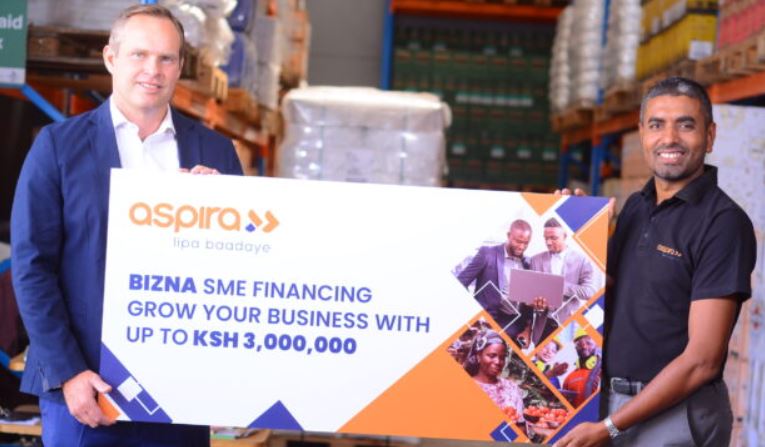
The firm also recently introduced education and business loan products targeting Small and Medium Enterprises(SMEs).
Aspira Chief Operating Officer Irshad Muttur spoke to Enterprise/Standard:
How does the buy now, pay later model work?
We register people on the Aspira platform where they provide their bank and M-Pesa statements.
We then check their credit bureau records using a lot of algorithms and machine learning to determine their repayment capacity. Based on that, each person gets a credit limit. Once you get the limit, you can go and shop at any of our partner retail stores.
You choose what you want to buy then an Aspira agent will coordinate with you to sign the loan contract and get the goods immediately but pay in instalments. Once someone buys from our retail store partner, we pay in full.
Where does this model fit in the current market for both your customers and partners?
It enables people to get what they want or need immediately and repay later. It also enables stores to sell on credit without having the risk of debt burden. They get paid as if it is a cash sale, but the customer repays later.
The buy now, pay later model is not necessarily new.
How do you make it attractive to the modern customer?
We offer speed, convince, and security and ask for no guarantee. We also practice responsible lending. Once someone provides all their information, it takes just a couple of hours to get a credit limit, which is valid for one year. In the past, I learnt that one had to get an endorsement letter signed by their chief to get such a facility.
Aspira does not give loans to people unless they can demonstrate they can repay. That brings about all the respectful interactions with people. We bring all aspects of life that affect repayments like calamity in their families.
What role has technology played in the growth of your business?
Financial technology has enabled speed and convenience. Today, you can rely on technology to authenticate people, weed out fraudsters or impersonators and review M-Pesa and bank statements.
Technology also has enabled us to serve the whole of Kenya. We are able to onboard our clients remotely.
Buy now, pay later is largely an unregulated financial product. How do you self-regulate?
Regulation starts with yourself. If you do not have solid governance, processes, policies and procedures in your company, then no matter how much you are regulated from the outside, you will not be operating in a proper manner.
We have a parent company that has been engaged in the same line of activity for more than 30 years and has all the governance processes and structures that are very well adapted to buy now and pay later.
Our internal standards are much higher than external ones, which we have to comply with.
We also comply with local regulations on financial reporting standards and data protection.
Our application for licensing as a non-deposit-taking microfinance company is in progress with the Central Bank of Kenya and we are very confident with being fully compliant.
What is your response to the argument that buy now, pay later is as expensive as higher purchase?
Buy now, pay later is a reinvention of hire purchase. It cannot be more or less expensive. In our operation, we do risk-based pricing, and this is in line with regulators.
In this, if someone has a lower risk profile (better), they tend to get a lower interest rate. Also, we give interest rate rebates for repeat customers.
Who are your target customers?
We target every Kenyan as long as they have the financial capacity to take on an additional facility.
We do not target a particular segment based on their income. What we look at is whether one is able to pay the facility without undue stress.
We have customers who have taken more than 12 and settled more than 12 facilities. More than half of our disbursement is to repeat customers.
What do you look for when seeking partner stores?
We partner with stores that can offer proper after-sales service and sell high-quality goods. If your customer is not satisfied, they may not willingly honour the loan obligations. We have more than 200 partner stores some of which have many branches, which translates to more than 500 partner stores. We enable them to sell more. We make sure that whatever they sell on credit through Aspira, they are paid on a weekly basis. We also assist them with communication and branding.
From the facilities taken, can you tell the most pressing needs of Kenyans?
When we started in 2018, we targeted individual customers with more consumer durable and lifestyle goods like furniture, mobile phones, TV sets, and appliances.
Over time, we found that our customers need to pay school fees, and that is why last year we came up with Soma Education Loan. We also found that many of our customers are SMEs. They are entrepreneurs and own businesses so they would be taking loans for them; that is why we launched Aspira Bizna, which is a facility targeting SMEs to help them grow by acquiring assets.
Why would someone come to you rather than go to a bank?
We don’t charge processing, application, administration and all those fees that banks charge. Aspira will not ask for collateral like title deeds. Our process is digitally enabled compared to most banks where the onboarding process is lengthy.
I cannot talk for banks but our solution is tailor-made for customers. I think we complement the banks. By virtue of our service having speed and convenience, it may be economical for short-term consumer borrowing, while bank loans might be convenient for the long term such as a house or land.








